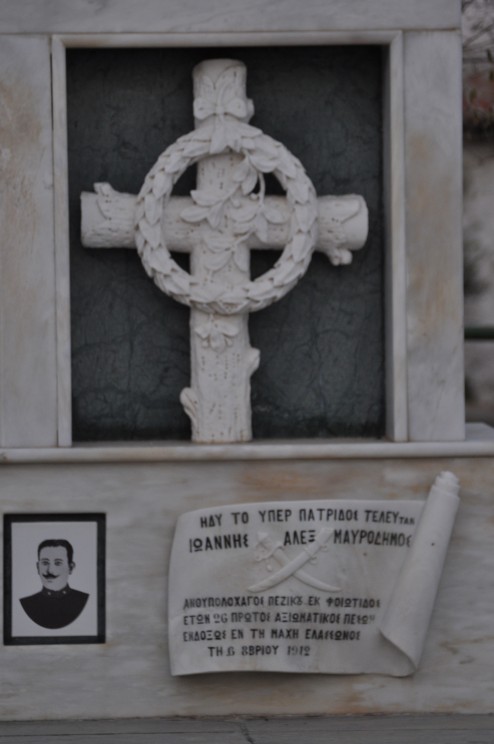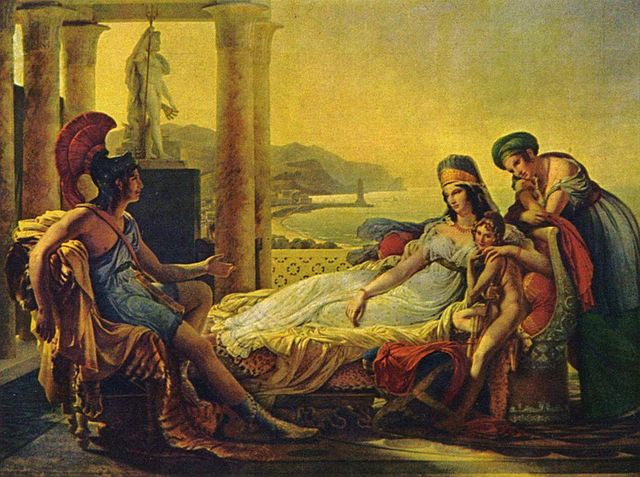Roman literature often derived from Greek sources, but took Greek models and made them its own. It includes some of the best known classical authors such as Ovid and Virgil, as well as a Roman emperor who found time to write down his philosophical reflections.

Saint Augustine’s Confessions by Saint Augustine
Augustine was a gifted teacher who abandoned his secular career and eventually became bishop of Hippo. His Confessions are a remarkable record of his wrestlings to accept his faith, his struggles to overcome sexual desire and renounce marriage and ambition. His final moment of conversion in a Milan garden is deeply moving.
On Obligations by Cicero
The great Roman statesman Cicero lived at the center of power. He was an advocate and orator as well as philosopher, who met his death bravely at the hands of Mark Antony’s executioners. On Obligations was written after the assassination of Julius Caesar to provide principles of behavior for aspiring politicians. Exploring as it does the tensions between honorable conduct and expediency in public life, it should be recommended reading for all public servants.
The Rise of Rome by Livy

The Roman historian Livy wrote a massive history of Rome in 142 books, of which only 35 survive in their entirety. In the first five books, translated here, he covers the period from Rome’s beginnings to her first major defeat, by the Gauls, in 390 BC. Among the many stories he includes are Romulus and Remus, the rape of Lucretia, Horatius at the bridge, and Cincinnatus called from his farm to save the state.
On the Nature of the Universe by Lucretius
Lucretius lived during the collapse of the Roman republic, and his poem De rerum natura sets out to relieve men of a fear of death. He argues that the world and everything in it are governed by the laws of nature, not by the gods, and the soul cannot be punished after death because it is mortal, and dies with the body. The book is an astonishing mix of scientific treatise, moral tract, and wonderful poetry.
Meditations by Marcus Aurelius
Roman emperor Marcus Aurelius was probably on military campaign in Germany when he wrote his philosophical reflections in a private notebook. Drawing on Stoic teachings, particularly those of Epictetus, Marcus tried to summarize the principles by which he led his life, to help to make sense of death and to look for moral significance in the natural world. Intimate writings, they bring us close to the personality of the emperor, who is often disillusioned with his own status, and with human life in general.
Metamorphoses by Ovid
The Metamorphoses is a wonderful collection of legendary stories and myth, often involving transformation, beginning with the transformation of Chaos into an ordered universe. In witty and elegant verse Ovid narrates the stories of Echo and Narcissus, Pyramus and Thisbe, Perseus and Andromeda, the rape of Proserpine, Orpheus and Eurydice, and many more.
Agricola and Germany by Tacitus
Tacitus is perhaps best known for the Histories and the Annals, an account of life under emperors Tiberius, Claudius and Nero. The shorter Agricola and Germany consist of a life of his father-in-law, who completed the conquest of Britain, and an account of Rome’s most dangerous enemies, the Germans. They are fascinating accounts of the two countries and their people, the northern ‘barbarians’. Later, German nationalists attempted to appropriate Germania in support of National Socialist racial ideas.
Georgics by Virgil
The Georgics is a poem of celebration for the land and the farmer’s life. Virgil doesn’t romanticize, rather he describes the setbacks as well as the rewards of working the land, and provides memorable descriptions of vine and olive cultivation, raising crops, and bee-keeping. It is both a practical agricultural manual and allegory, and brings the ancient rural world vividly to life.
Aeneid by Virgil
The story of Aeneas’ seven-year journey from the ruins of Troy to Italy, where he becomes the founding ancestor of Rome, is a narrative on an epic scale. Not only do Aeneas and his companions have to contend with the natural elements, they are at the whim of the gods and goddesses who hamper and assist them. It tells of Aeneas’ love affair with Dido of Carthage and of Aeneas’ encounters with the Harpies and the Cumaean Sibyl, and his adventures in the Underworld.
Heading image: Roman Virgil Folio. Public Domain via Wikimedia Commons.
The post A reading list of Roman classics appeared first on OUPblog.

By J. C. McKeown
The National September 11 Memorial Museum will be opened in a few weeks. On the otherwise starkly bare wall at the entrance is a 60-foot-long inscription in 15-inch letters made from steel salvaged from the twin towers: NO DAY SHALL ERASE YOU FROM THE MEMORY OF TIME. This noble sentiment is a quotation from Virgil’s Aeneid, one of mankind’s highest literary achievements, but its appropriateness has been questioned. In the context of the Aeneid, Virgil is commemorating a homosexual pair of warriors killed while making a bloody surprise attack on their sleeping enemies’ camp. Three years ago, an article in the New York Times suggested that “anyone troubling to take even a cursory glance at the quotation’s context will find the choice offers neither instruction nor solace.” But the museum was unmoved by such objections, and its director has recently defended the choice, asserting, perhaps rather cryptically, that the quotation characterizes the “museum’s overall commemorative context.”
It is unfortunate that this controversy has arisen, especially since so few people nowadays know about the context of the quote in the Aeneid. Those who lost family members or friends in the attacks should not have their thoughts and feelings distracted in this way. The sentiments expressed on national monuments aim to be strongly and unambiguously assertive of a view held by the whole community, but perhaps they are inherently vulnerable to controversial interpretations. Ideally, of course, such quotations should resonate more deeply than the meaning of the actual words, but would it not be best to accept the obviously sincere intentions of the museum’s committee and let the matter drop?

“It is sweet and fitting to die for one’s country” in classical Greek on a memorial honoring the dead in the First Balkan War. Credit: J.C. McKeown
Otherwise, where will it end? Should we hesitate about using dulce et decorum est pro patria mori (“It is sweet and fitting to die for one’s country”), a line by Horace, Virgil’s contemporary, found so often on war memorials? In the 1910s, it was inscribed at Arlington and at Sandhurst, the British military academy, and was even translated into classical Greek (mirabile dictu!) on a memorial honoring the dead in the First Balkan War.
Before the decade was out, however, in the most celebrated of all World War I poems, Wilfred Owen had described Horace’s line as “the old lie.” Horace’s own authority to voice such ideals may be questioned. He was writing a poem of national significance–it is one of his “Roman Odes”–but the very next line, “death pursues even the man who runs away,” might make us recall a different poem in which Horace rather flippantly admits that he had thrown away his shield and fled at the Battle of Philippi. These considerations may give us pause for thought, but the validity of dulce et decorum in a national context is not diminished.
Carpe diem is perhaps the most ubiquitous of all Latin tags, but few people are aware of its original use: Horace is trying to persuade a girl to sleep with him. In another quote from the same book of Odes, Horace assures us that a person who is integer vitae scelerisque purus (“He who lives an unblemished life and is not tainted with crime”) is under divine protection, but the poem is essentially trivial, for Horace’s guardian deity turns out to be Cupid, who keeps wolves at bay while he sings in the woods about his mistress; even so, the poem was sung for centuries at Swedish funerals.
The fundamental democratic principles of equality and unity encapsulated so precisely in e pluribus unum are surely not diminished by the possibility that it was inspired by a phrase from an inconsequential poem attributed to Virgil: color est e pluribus unus (“from being several, the color is one”), in a description of an old peasant grinding the various ingredients together to make a vegetable pâté for his breakfast.
We have difficulties enough with the nuances of our own language. How many of those who wear T-shirts emblazoned with The Road Not Taken regard Frost’s best known poem not so much as a declaration of their free spirit, but rather as “that cunning nugget of nihilism disguised as an anthem for nonconformity” (New Yorker, 10 February 2014)?
Even Virgil himself has been charged with quoting inappropriately. When Aeneas stammers to Dido’s ghost in the Underworld, invitus, regina, tuo de litore cessi (“unwillingly, O queen, I left your shore”), it is an undoubted echo of Catullus’s translation of an elegant Hellenistic court poem, in which a lock of Queen Berenice’s hair laments that it is now a constellation, no longer with the queen: invita, o regina, tuo de vertice cessi (“unwillingly, O queen, I left your head”). To quote the standard commentary on Virgil’s line: “modern susceptibilities are pained by Virgil’s presumed indifference to the incongruity so produced.”

Aeneas tells Dido the misfortunes of the Trojan city. Oil on canvas, 1815. Pierre-Narcisse Guérin, The Louvre. Public Domain via Wikimedia Commons.
There is classical precedent for changing a memorial inscription. After the Greek victory over the Persians at Plataea in 479 BC, the Greek commander set up an inscription at Delphi: “Pausanias, leader of the Greeks, when he destroyed the army of the Persians, dedicated this memorial to Apollo.” He was ordered to remove it, and told he could put it up again when he had defeated the Persians single-handedly. Might that be the best solution to all this controversy? The task of re-writing the inscription might be given to Billy Collins, who was Poet Laureate at the time of the attacks. He would be sure to resist those who want to:
“tie the poem to a chair with rope
and torture a confession out of it.
They begin beating it with a hose
to find out what it really means.”
J. C. McKeown is Professor of Classics at the University of Wisconsin-Madison, co-editor of the Oxford Anthology of Roman Literature, and author of A Cabinet of Greek Curiosities, A Cabinet of Roman Curiosities, and Classical Latin: An Introductory Course.
Subscribe to the OUPblog via email or RSS.
Subscribe to only classics and archaeology articles on the OUPblog via email or RSS.
The post The 9/11 memorial and the Aeneid: misappropriation or sincere sentiment? appeared first on OUPblog.










